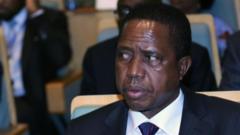Lifesaving health programs and medical research projects across the globe are facing disruption following a 90-day pause on foreign aid by the Trump administration. The suspension has led to halted interventions against diseases, impacting vulnerable populations in various developing countries.
Global Health Initiatives Threatened by U.S. Foreign Aid Pause

Global Health Initiatives Threatened by U.S. Foreign Aid Pause
The Trump administration's temporary halt on foreign aid has led to the suspension of critical health programs globally, creating a crisis for numerous initiatives against diseases like malaria and H.I.V.
Lifesaving health initiatives and clinical research efforts across various nations are experiencing severe setbacks due to a recent 90-day pause on foreign aid mandated by the Trump administration. This decision has resulted in the suspension of key programs addressing diseases like tuberculosis, malaria, and H.I.V., leading to dire consequences for many communities reliant on these services.
In Uganda, for instance, the National Malaria Control Program has ceased its operations of distributing insecticide-treated nets and spraying homes with insecticides. Dr. Jimmy Opigo, the program director, expressed concerns about the impending rise in malaria cases due to these halted activities.
Similarly, in Zambia, essential medical supplies meant for emergency treatments, such as drugs to prevent hemorrhaging during childbirth, are stuck in transit. Trucking companies that facilitate these deliveries were funded by a U.S. Agency for International Development (USAID) project, which has also seen its operations suspended.
The pause has not only affected treatments but has also put a stop to dozens of clinical trials across South Asia, Africa, and Latin America. Thousands of participants, who had been enrolled in various studies, now find themselves without proper care or access to critical follow-up treatments and support from researchers.
The impact of these disruptions is palpable as many program managers and health researchers, fearful for their jobs and the future of their initiatives, have requested anonymity while speaking about the chaos. In emotional interviews, they highlighted the loss of years of hard work, infrastructure, and progress made against diseases that disproportionately affect vulnerable populations.
As nations scramble to adjust to this unexpected halt in aid, the implications could be far-reaching, with many risking a return to severe health crises exacerbated by the lack of preventative measures and care previously funded by the U.S. government. The current situation raises questions about the future of international health aid, the implications for global health security, and the potential human cost of such policy shifts.





















